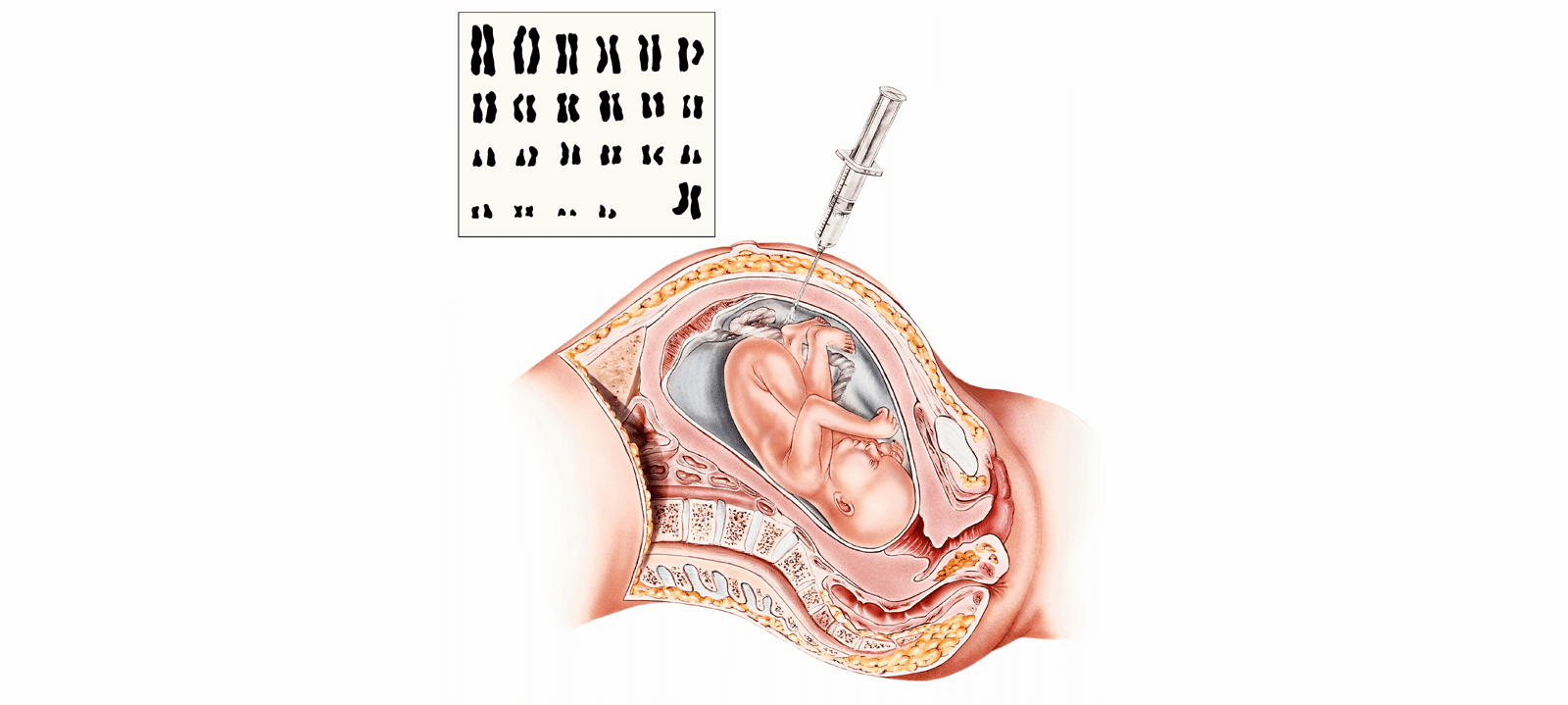What is an amniocentesis test?
An amniocentesis test is a procedure that involves taking a small sample of the amniotic fluid from around the baby when testing for chromosome abnormalities like Down syndrome or doing genetic testing in a family with a known genetic disease.
It is done from 15 weeks by passing a very fine needle through the wall of the womb under ultrasound guidance and taking a small volume of amniotic fluid that surrounds the baby.
The cells that are suspended in the fluid are extracted in a laboratory where they can be processed and examined. It provides a way of doing very accurate testing for chromosomal and genetic problems.
It is associated with a small risk of miscarriage estimated at a 1 in 200-300 chance.
What testing is done on the amniotic fluid?
The most common indication for amniocentesis is testing for chromosomal problems like Down syndrome. The risk of Down syndrome may be considered high when nuchal screening results from the 12 week scan have suggested a high risk, if the mother is older than 35 years or when there is a known chromosomal abnormality in the parents.
Two amniocentesis tests are run on the fluid – one a rapid simple check and the other a longer culture test. We will phone the results through to you within two working days of the amniocentesis. If we are doing the test because of a high risk nuchal result in a baby that looks normally formed, then the results of a normal rapid test are extremely reliable.
The culture test allows the scientist to check all the chromosomes more thoroughly and takes bout 2 weeks to report. It allows us to double check the Down’s result and also to look for rarer problems that relate to breakages or rearrangements of chromosomes.
More complex genetic testing on amniotic fluid for familial conditions may need to be sent to laboratories interstate and can take longer. Often we will do this in consultation with genetic specialists from Nepean Hospital and will keep you informed of results as they arrive.
ON THE DAY
- We suggest you come with a family member or friend who can take you home.
- You will have the chance to speak with our doctor before the test to go over the reasons for the test and what is involved. You will then be taken into one of the scanning rooms where the baby will be checked and an appropriate pocket of fluid found.
- After checking the baby with the ultrasound the skin is cleaned and a very fine needle is passed through the skin and into the amniotic sac using ultrasound as a guide to avoid any contact between the needle and the baby.
- About 20mls of fluid is taken and then the needle is withdrawn. The amniotic fluid at this stage is mainly fetal urine and this is constantly recycled by the baby through drinking, breathing and normal kidney function. The small amount taken in an amniocentesis is usually replenished within hours.
- The baby is observed to reassure the mother that the baby is OK.
- Most women describe the pain involved as mild and almost always much less than expected.
- In the next few hours after the amniocentesis test you may experience some period-like cramps. Simple pain tablets like paracetamol and rest usually work well. It is best to arrange the day off work in case you feel uncomfortable.
- One in twenty women experience a small leak of amniotic fluid vaginally several days after the test. This normally settles with rest but you should let your obstetrician or our rooms know as we will monitor the situation and if necessary rescan the pregnancy to check on things.
- The risk period for miscarriage is roughly 2 weeks. Symptoms to watch for are persistent fever, persistent or worsening cramps and vaginal bleeding or foul smelling discharge. If any of these happens please notify us and your doctor so we can assess the situation.
- If you have any concerns, our doctors can be contacted at the practice you attended.
IMPORTANT POINTS
Arrange help or time off work on the day of the test.
We need to know your blood group. This is often on your yellow card or in your doctor’s records – please bring with you.
Women with a Rhesus negative blood group need an injection of antiD after the procedure which we arrange for you.
Let our staff know if you take regular aspirin or Clexane as we may need these stopped a few days before the test.
The laboratory will send you a separate bill, a significant amount of which will be refundable by Medicare. The results will be phoned through to you by our doctor.
If you have any concerns about your amniocentesis, test please contact the practice you attended to speak with one of our doctors.

Our locations
Penrith
Meet our specialists who are experts in ultrasound, high risk obstetrics, reproductive genetics and prenatal diagnostics